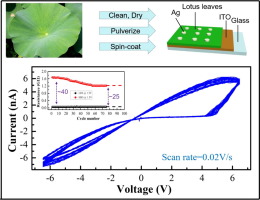Chemical Physics ( IF 2.3 ) Pub Date : 2018-09-11 , DOI: 10.1016/j.chemphys.2018.09.008 Yiming Qi , Bai Sun , Guoqiang Fu , Tengteng Li , Shouhui Zhu , Liang Zheng , Shuangsuo Mao , Xiang Kan , Ming Lei , Yuanzheng Chen

|
The resistance random access memory (RRAM) based on biomaterials, which has the advantages of sustainable, green and environment-friendly, has great potential application in the sustainable electronic devices. Herein, lotus leaves, a very common aquatic herb serve as a dielectric layer, was used to prepare an organic resistive switching memory device with Ag/Lotus leaves/ITO structure for the first time. The biodegradable electronic device demonstrates a nonvolatile resistive switching memory behavior with large resistance ratio and long switching endurance at room temperature. This work exhibits the application prospect of the biomaterials in electronics with the biodegradability and biocompatibility, which provide an effective supplement to the research of organic bio-RRAM.
中文翻译:

基于荷叶的非易失性有机电阻开关存储器
基于生物材料的电阻随机存取存储器(RRAM)具有可持续,绿色和环境友好的优势,在可持续电子设备中具有巨大的潜在应用前景。此处,首次使用荷叶作为一种非常常见的水生植物作为介电层,以制备具有Ag /荷叶/ ITO结构的有机电阻开关存储器件。该可生物降解的电子装置表现出具有大电阻比和在室温下长的开关耐久性的非易失性电阻式开关记忆行为。这项工作展示了具有生物降解性和生物相容性的生物材料在电子学中的应用前景,为有机生物RRAM的研究提供了有效的补充。



























 京公网安备 11010802027423号
京公网安备 11010802027423号